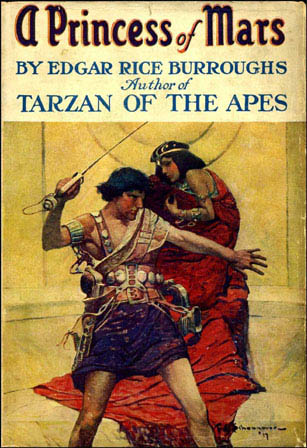 A definitive example of formative pulp science fiction, A Princess Of Mars certainly has some things about it that are shaped by its time, and seem a bit corny now, almost a hundred years after its first publication. I started the book wondering to what extent I might enjoy it, and to what extent I would find it awkward, clumsy, and more like something I read because I ought to have read it, because of its place in literary history. I was pleasantly surprised.
A definitive example of formative pulp science fiction, A Princess Of Mars certainly has some things about it that are shaped by its time, and seem a bit corny now, almost a hundred years after its first publication. I started the book wondering to what extent I might enjoy it, and to what extent I would find it awkward, clumsy, and more like something I read because I ought to have read it, because of its place in literary history. I was pleasantly surprised.The literary style has that quality that seems, by comparison to today's writing, a little stiff and wordy, yet charming in its own way, that marks it as a product of its period. You can either enjoy this or you can't. Personally, I can enjoy small amounts, but in enough quantity I start to find it tedious, but not enough to prevent me appreciating a book if there's other things about it to like. Princess balanced some of the stiffness with some breathless enthusiasm, and it kept the style from being a big factor.
The plot depends, as was far more common in that time, on a remarkable quantity of coincidence. Everyone you meet, even if by the most random of chance from amongst a population of a million, will happen to be either the most unusual specimen of his kind, or connected to someone else in the story by improbable twists of fate, or otherwise of a remarkable level of importance. Every location stumbled upon in the dark will turn out to be crucially important either to the plot or the exposition of the premise. Even in this regard, the book does not fall as far as many of its period; sometimes an unlikely plan will fail (though only when it happens away from the narrator's sight; everything he endeavors succeeds despite how fragile the plan was), and sometimes expectations are turned upside down.
Most fiction, especially speculative fiction, of the time tends to have very broad analogies to real-world circumstances. Distressingly many of these works are little more than thinly-veiled retellings of, or commentaries on, contemporary political or social happenings, with only the slighest amount of effort made towards exploring what would really be different about the other places, times, or peoples amongst which the story is set. (The exceptions usually swing too far the other way, being nothing but a dry, academic exploration with no plot to hang it from. The best-loved books from the time are usually those which find the line between these.) Princess threatens to do this by speaking at length of the savagery of the "red men" of the southwestern United States, then immediately transporting the main character to the midst of a people that are notably savage. Many other opportunities for social commentary are presented throughout the book.
Yet while the author is not entirely free of the influence of his time and place, and dabbles from time to time in analogy and comparison, by and large the book is not driven by those analogies, and is as likely to skewer as embrace them. Better yet, it spends an uncharacteristic amount of time exploring what might be different about the world on which the story happens (Mars, if the title didn't make that obvious), but without getting so bogged down in it that there isn't time for a rollicking adventure.
All in all, while I wouldn't count it the equal to my tastes of the modern adventure stories that owe so much to these first steps, I spent far more of the book enjoying it than forcing myself through it for the sake of being a well-rounded consumer of science fiction and literature, and student of its history. While I've heard that subsequent books lose some of the feel of this one, and I can see how likely that is (so much of the pleasure in this one is in the exploration of the world which has already been mostly done), I may give another one or two a try.

 RealTime and RTC
RealTime and RTC Prism
Prism Uncreated
Uncreated Bloodweavers
Bloodweavers Foulspawner's Legacy
Foulspawner's Legacy Lusternia
Lusternia
1 comment:
I am glad you enjoyed the book. This is a cherished series from my youth; I read them in my early teens which is certainly to some extent the intended audience.
I would recommend the you try the next two. The first three books form a loose trilogy. The next three are independent stories, but also quite good.
Post a Comment